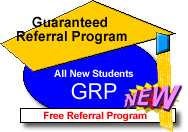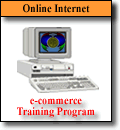|
The
course schedule is one of the most import documents
in this program. It enables you to navigate
our extensive training materials. Despite the
challenges ahead, with patience, fortitude, the
right tools and a little luck, you’ll enjoy
incredible success
as a disability advocate regardless of your location
or level of competition.
We have developed a more efficient training approach
for 2012 that incorporates our new Olivia 2.0
software. This new Olivia software will
greatly improve your chances of success in this
field. Olivia will also enable you to serve
your clients better by providing built-in client
communication capabilities that where not previously
possible.
Our
training schedule is now divided into seven
major phases. Each phase contains business
milestones that should be achieved before moving
forward in the course. This approach enables you to quantify your progress.
Please print this document and mark off each step as
you progress through the course. If you have
any questions, please feel free to contact us at
stussa@daincpm.net. We're here to serve you!
Working Effectively with Your
Mentor
Starting a business is no joke! This is
especially true in hard economic times. You've
trusted your hard-earned dollars to our training
program and it’s our duty to provide you with the
best information and training available.
However, you and I both know that it takes
more than just a course to succeed.
No single training course in the world can
provide you with the settle unspoken often
overlooked bits of knowledge that can make or break
your business. That's what a mentor is for!
To be there for you when you need him/her most.
If you're really serious about success as a
disability advocate, get a mentor for the first
year of your business. The support is well
worth the money and you'll be glad you did!
Over the years we have inevitably encountered
personalities that clash. This can be avoided
by clearly defining our respective positions.
It's our job as your mentor to do everything we can
to share useful knowledge that will help you to
succeed as a disability advocate. We cannot
make you into a stronger, better or wiser business
person. That's up to you. We must be
able to speak frankly to our students.
If you’re easily offended, buck-up.
Everyone who enters this field is confused beyond
belief at first. That's why a frank, open and
honest mentor relationship is so important to your success.
With a mentor, you have someone dedicated to your
success. It's in both you and the mentor’s
best interest that you work together and succeed.
Use your mentor as a window of understanding that
can help you to absorb this complex subject.
Don't be shy about contacting your mentor for help.
You must seek assistance when you need it -
otherwise
we have no way of knowing
you need help! Be
prepared to take notes during a mentor session.
Also make a note of where you and the mentor left
off in your last conversation. This will
enable you to remind the mentor of where you are so
he can get back on the same page faster. A
mentor may be supporting up to thirty other
individuals, so
help
your mentor to remember you and your issues.
At certain periods during your training, your
Mentor
will be prepared to walk you through a series of
training exercises. The first encounter with
your
Mentor
will usually occur at the beginning of your
training. However, the course is presented in
such a way that you can always navigate back to the
training home page.
If you're having any problems getting
oriented to the course, mentor or not, contact us
for help.
Case Debriefing
The first case debriefing will occur after you have
completed both the Study and Business Guides within
your course.
These two textbooks contain the main sixteen
lessons of the course and represent the basic
portion of your training.
After completing these lessons, you’ll receive
your personalized Certificate of Completion and
instructions to schedule your first case debriefing.
The first three debriefings are available to all
students mentor or not. Subsequent debriefings
will be reserved for those with mentor support.
During this first debriefing, your mentor will walk
you through a typical disability case. This
debriefing will afford you the opportunity to ask as
many questions as you like. This meeting is
almost effortless on your part and a great way to
starting getting a feel for your service.
In subsequent meetings with your mentor, he'll
direct your progress while you set the pace.
He'll guide you in common areas like materials,
equipment and marketing. Depending on your
course level, you'll experience
up to seven formal debriefings in all. These debriefings
will cover case processing, documentation, marketing
and more. Here is a link to the
debrieifing schedule. Course Schedule
located below. Print both schedules for your
records.
|
Syllabus and
Other Resources

|
The course Syllabus contains
materials, links and other
training aides. As you
progress through the first
sixteen lessons of the Study
and Business Guides, these
lessons will make reference
to materials found inside of
the Syllabus. Materials
under Resources are used for
both training and
operations.
|
|
Advocate Training Phase One

Study Guide
1. Begin your training by reading the Study Guide
(SG) lesson one. Whatever you do, don't try to
memorize this stuff! You'll learn that viewing
this process with a wider lens makes handling later
details much easier.
Begin your course by reading all paperwork provided
in your training package delivered by e-mail.
Make sure that you keep a safe copy of your
membership letter, software license codes and
invoice sheet for your records. If you're
using Olivia, these records are kept for you inside
of your account. If there's a change or update
in the course, it will be reflected in this online
schedule or in the “What's New” segment of our home
website. Use this schedule as your primary
guide to navigating the course.
2. After completing lesson one, take the Study
Guide (SG) lesson one quiz. If you pass the
quiz, click the completed button and proceed to the
next Study Guide lesson.
3.
Repeat the above actions in the Study Guide (SG)
until you have completed all eight lessons. As
you proceed through the Study Guide lessens, you'll
also be requested to read chapters within the
Social
Security Disability Guide.
|
During the course, you'll also be
introduced to various Olivia software
efficiency tool. Think of these
Olivia systems as dedicated tools used
to operate an advocacy service.
|
4.
Download a copy of the Social Security Guide located
on the course homepage. Read the SSDG
Introduction and Chapters
1 and 2.
5.
Read lesson two in the SG.
In
the first two lessons of the SG you were introduced
to the case assessment process. Within the
Olivia software we have created an automated case
assessment tool. This tool can be used in a
number of ways. However, it's primarily used
to assess a first contact client's chances of
winning disability benefits. This tool is
designed to reduce the number of weak cases accepted
by new students. It significantly reduces the
amount of unpaid work performed by an advocate.
6.
If you plan to accept child cases, read
Chapter 3
in the Social Security Guide.
7.
Read lessons 3 and 4 in the Study Guide.
8.
Access your Systems Explorer at the top of this
page. Along with the short system explorer
chapters, read the expanded medical information
provided in the Social Security Guide beginning with
Chapter 16 Musculoskeletal disorders. The
Systems Explorer and the SSDG are used together to
reference various diseases that are regularly
represented by disability advocates.
The
DRG is also helpful in evaluating physical
limitations caused by various impairments.
9.
Read Chapters 4, 5 and 6 in the Social Security
Guide.
10. Read lessons 5 and 6 Study Guide.
Take the quizzes.
11. Load your Office Suite. The Voc
Analyzer is located inside the Office Suite.
To access the Voc Analyzer, open the Active Client's
page in the Office Suite. Enter at least one
client name into the system. Click on a name
and perform VA. Olivia also contains an
expanded version of our Office Suites Voc Analyzer.
12. Read Chapters 7, 8 and 9 in the Social
Security Guide.
13. Read lessons 7 and 8 in the Study
Guide. Perform lesson 7 and 8 quizzes. Be sure
to send the online lesson completion
notices as instructed.
14. Read Chapters 9, 10 and 11 in the Social
Security Guide.
Advocate Training Phase Two

Business Guide Start Here!
1. Read lessons 1 - 4 in the Business
Guide (BG). Take the lesson quizzes. If
you're satisfied with your score, move on to the
next lesson. Repeat this training pattern with
all remaining business guide lessons.
2. Visit
the Olivia website and open your account.
This is an opportunity to get familiar with
the program. In the Olivia system, many of the
processes described in the Business Guide are built
into the program. Visit Olivia explorer the
program.
3. Read
lesson 5 of the Business Guide. Take the
lesson 5 quiz.
To prepare for business, you must create the basic
documentation used in the day-to-day operation of an
advocacy service. These documents include your
contract, business cards, stationary, customer
instruction letter, brochures, Information and
Guidance Packets. These materials are
discussed within the BG.
4.
Read Chapters 12, 13 and 15 in the Social Security
Guide.
5.
Read lessons 6 - 8 in the Business Guide.
Finish up the remaining BG lessons 6 - 8 quizzes.
The send the online lesson completion notices to Dr.
Scott. When you send the
BG lesson
eight completion notice, you'll trigger the request
for your Certificate of Completion. You need
do nothing else until you receive your certificate.
Along with your certificate, you'll also receive
further training instructions and an opportunity to
schedule
your first case debrieifing.
We must have all 16 lesson completion notices before
your certificate will be awarded. As previous
mentioned, your final BG lesson completion notice
will trigger the request for your certificate.
Allow up to 7 days to receive your custom
certificate.
If you do not receive your certificate within seven
days, please notify our office. This is also
the point where you should contact your Mentor to
schedule your first case debriefing.
Debriefing Schedule.
|
Advocate
Training Phase Three

Marketing Manual
Start Here!
|
At
this point in your training, it's time to start
thinking about marketing. This is a good time
to sit down with both your marketing manual and a
basic business Start-up Guide. These two texts
will help you make important decisions about your
service. For additional marketing suport, see
mentor debriefing schedule. Do not hesitate to contact
our office for assistance in developing your
marketing
strategy.

As a new Advocate, the sooner you begin processing
cases the more likely you'll succeed in this field.
For this reason, we have created the
GRP
or
Guaranteed Referral Program.
Working with eGGenerationMarketing, we are able to
assist you in acquiring that all important first
client. Each purchaser of our
Consolidated
training program will receive up to
five
free
screened
starter
leads when you sign up for this program with eGenerationMarketing.
T
If you decide to
use the eGenerationMarketing referral service on a
longer-term bases, you'll also enjoy a significant
Student
discount
off the regular price of these
already
low priced leads. You may even fine that
referred leads are more cost effective than regular
Internet or media advertising. To receive your
free leads, join eGenerationMarketing by
clicking here. An eGenerationMarketing
consultant will contact you after you submitt their
form. Be sure to tell them that you are a
student of Disability Associates.
|
Advocate
Training Phase Four

e-commerce
marketing and website strategies
|
For website development and e-commerce training,
visit the e-commerce website. This training
segment will provide you with a business
understanding of e-commerce and show you how it’s
used in disability advocacy. The best
techniques will come from working with your mentor.
You and your mentor's combined evaluation of your
market will help to determine your initial marketing
strategy.
Creating Website
A Website is a critical marketing tool for all
businesses big and small. In today's economy,
you must have a web component in order to sustain
your business over time. A website enables you
to multiply yourself, increasing your ability to
communicate with potential customers. A
properly designed website should at the very least
act as a conduit of information between you and your
customers. Customers can learn about your
service without you providing a personal
presentation to each and every one. It can
also be used to collector and transfer data in a
variety of formats. Having a website reduces
your marketing workload and significantly improves
your ability to succeed as a disability advocate.
Note:
Disability Associates offers a large variety of web
related IT services. We make it easy for you
to create a website with the business persona you
wish to convey. We also provide direct
assistance in creating any custom capabilities your
desire. This means that you can acquire a
website, website content, URLs, hosting accounts,
business e-mail accounts, custom logo production,
custom header production, website optimization and a
host of other services directly from us.
Having a web presence is no longer an option.
All advocates should have a business website even if
you're only practicing on a part-time basis.
|
Advocate
Training Phase Five

Executive Advanced
Training Website
|
The
Executive website contains a variety of articles
that discuss advanced topics within the field of
Social Security disability advocacy. Review
these materials at your leisure.
Sign-up for Olivia 2.0
When you've completed your
course, you're ready to begin operations. To
operate, you need the right kind of office with the
right kind tools. Olivia 2.0 is a secure
office already furnished and ready for your
occupation. Sign-up for an Olivia account
today! Olivia will quickly become the only
office you need with a monthly rental fee starting
as low as $79.00.
Student Support
Although this is a self-paced, you’ll need help on
occasion. We want to make the process of
acquiring help as easy as possible.
Disability Associates provides multiple layers of
support to all students on all training levels.
If you're a purchaser of our course, you can acquire
answers to your questions using the student e-mail
support address at
stussa@daincpm.net.
If you're an Mentorship level student, you can call
us directly to speak to your mentor at 303-766-1111
or use the student support email.
Our
offices are open M-F from 9:AM to 5:30 PM Mountain
Time.
Get started now by
following
the instructions in your course
schedule!
|
|

